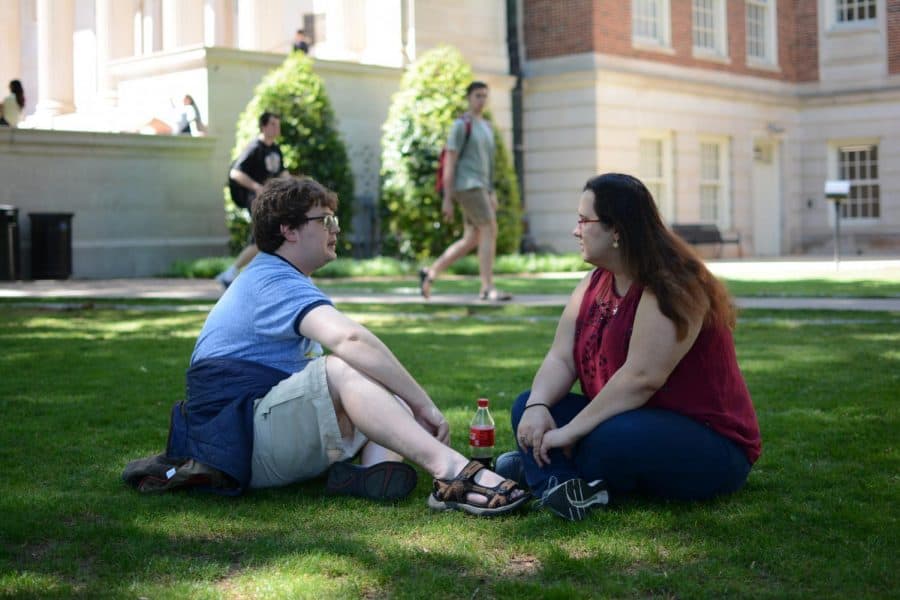Autism Awareness Month brings focus to campuses
UA-ACTS program highlights experiences of students with autism
April 15, 2019
Often seen, then misunderstood and then uncomfortably ignored, autistic students make up a large minority on college campuses. While there is no specific data on the population of autistic students at UA, prevalence rates estimate that one in 59 people is autistic, according to the CDC.
The UA Autism Spectrum Disorder College Transition and Support (UA-ACTS) program helps students with autism during their time on campus.
“All students in UA-ACTS are degree-seeking students who meet the requirements for admission to the University, the same as anyone else,” Megan Davis, UA-ACTS program director, said. “Students just join our program for extra support in a couple of areas. … We work on academic organization, social skills and daily living and career building skills. Since we are housed in the psychology department, we also offer a therapy component in addition to a study hall and structured social activities.”
This year, Autism Awareness Month arrives just as the anti-vaccine debate is in the news cycle yet again. Parents against vaccinations for commonly preventable diseases often cite fears of “giving” their children autism. No reliable research supports this claim.
“I feel that anti-vaxxers act like autism is the worst thing to happen to anyone,” said Nadia Dugas, a senior majoring in human development and family studies. “It can be a scary thing to be diagnosed, but it’s not insurmountable. Life still goes on, and using anti-autism rhetoric against vaccinations is very harmful to autistic people, as well as dangerous to society.”
With so many people talking about or for them, self-advocacy is important to students with autism. Many neurotypicals, or people not on the autism spectrum, have misconceptions about people with autism, Mitchell Lord, a senior, majoring in economics, said.
“[Neurotypicals] either see us as asses like Sheldon [from “The Big Bang Theory”] or miracle savants when we’re really just people who love talking about trains or whatever it is that we’re interested in,” Lord said.
Though much emphasis is placed on the social struggles of autism, the diagnosis process itself can be an ordeal for people with autism who were not diagnosed before three years of age.
“Back when I was being diagnosed, the terms autism, Asperger’s and PDD [pervasive developmental disorder] were all thrown together so badly that you could end up with all three based on who administered the test,” Lord said. “My worst experience was being told I was crazy or stupid, that nothing was wrong with me and I just wasn’t trying hard enough. Finally finding out there was really something wrong with me was an actual improvement.”
Dugas had negative experiences when she was open about her autism in her freshman year. When she disclosed her diagnosis to a group of friends at a party, one girl told Dugas she could not be her friend because she did not know how to be friends with someone who wasn’t “normal.”
“Though she was honest, it was ignorant of her to say that and really just mean,” Dugas said. “Even though we’re not neurotypical, we’re still human beings and we’re still created equally. … What I like about UA-ACTS is that they understand when you meet one autistic person, you haven’t met them all. They know that you meet the individual for who they are and where they are.”
At such a large university, neurotypical students are going to encounter students with autism in their classes and groups. Accepting students with autism when they may overcontribute in class or make a comment that is out of place is key, Davis said.
“I would encourage people to go up and have a conversation with an autistic student,” Davis said. “A lot of times [neurotypicals] will acknowledge the person, but they aren’t sure how to proceed. Our students are just like any other students on campus. Having a normal conversation with them can help get rid of some discomfort and build understanding.”
For more information on the UA-ACTS program, visit www.autism-clinic.ua.edu/uaacts/.
For ways to contribute and volunteer, visit www.autism-alabama.org, the website of the Autism Society of Alabama.





















